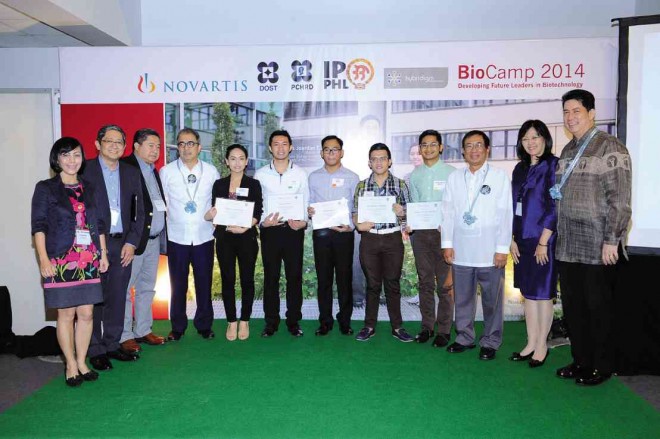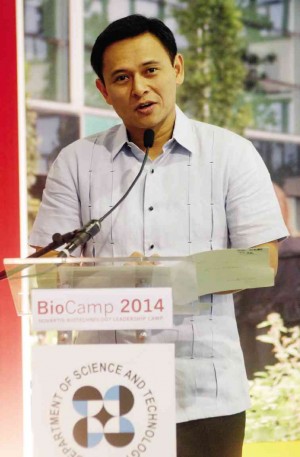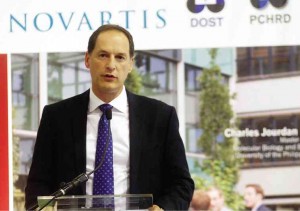Five to go ‘camping’ in Switzerland

BIOCAMP 2014 delegates with (from left) Novartis Healthcare Philippines’ Christine C. Fajardo, corporate affairs and market access director, and Dr. Francis M. Domingo, chief scientific officer; Ricardo R. Blancaflor, Intellectual Property Office director general; Science Secretary Mario G. Montejo; Health Secretary Enrique T. Ona; Carmencita Padilla, and Dr. Jaime C. Montoya, executive director, Philippine Council for Health Research and Development PHOTO COURTESY OF NOVARTIS
Five young, promising scientists got the shock of their lives during the recent Novartis Biotechnology Leadership Camp (BioCamp) at the SMX Convention Center.
Told beforehand that the BioCamp would send only two to the Novartis Campus in Basel, Switzerland, to attend the international BioCamp on Aug. 24-27, the five postgraduate students were pleasantly surprised when the Department of Health and Department of Science and Technology (DOST) decided to sponsor the participation in the camp of the other three.
The Switzerland-bound students are Arjelle Agupitan, Gerald Aquino, Alvin Bello, Kin Notarte and Jortan Tun.
Agupitan is a 2014 magna cum laude graduate of the University of the Philippines (UP) with a Bachelor of Science in Molecular Biology and Biotechnology degree and recipient of the Leticia Shahani Award for best undergraduate thesis. She is currently taking her masters in molecular biology and biotechnology, also at UP.
Aquino is a 2010 UP magna cum laude graduate, BS Molecular Biology and Biotechnology. Like Agupitan, he is pursuing a master’s degree in molecular biology and biotechnology at UP. A recipient of the Academic Excellence and Leadership Award, he is currently a university research associate at the National Institute of Molecular Biology and Biotechnology.
Article continues after this advertisementBello, who graduated cum laude from UP in 2010 with a BS Molecular Biology and Biotechnology degree, is finishing his thesis for a master’s degree in molecular biology and biotechnology at UP. He worked as senior research associate at the Aquatic Biotechnology Laboratory of the National Institute of Molecular Biology and Biotechnology before becoming an instructor at the College of Science in UP Diliman.
Article continues after this advertisementA 2013 magna cum laude graduate of Silliman University with a BS Biology degree, Notarte is pursuing a master’s degree in microbiology at the University of Santo Tomas (UST). He is currently affiliated with the UST Research Center for Natural and Applied Sciences.
A BS Biology graduate of UP Baguio, Tun is working on a master’s degree in Molecular Medicine at St. Luke’s College of Medicine on a DOST-ASTHRDP (Accelerated Science and Technology Human Resource Development Program) scholarship.
High anxiety
Tun said everyone was anxious the night before the actual selection, knowing only two would be chosen. “It seemed they would choose one boy and one girl, and there was just one girl…. We thought she (Agupitan) was sure [to have a] slot,” he said.
Tun said it was his third attempt to become a delegate to the international BioCamp. He made the short list in 2010 but was out of it last year.
“It is really a wonderful opportunity…. There are limited resources but I believe this is a good investment,” Tun said. “The progression becomes more geometric. There will be a lot of seeds planted all over the scientific community.”
Keynote speaker Sen. Sonny Angara underscored the need to make young people interested in scientific discovery. Research was left out in the national agenda, he told about 150 young biotechnology enthusiasts. He cited Singapore, which propelled its development through a high and sustained investment in research.
Angara said students’ research projects must address the pressing issues in the country, especially the rising cost of health care, decreasing food production and depleting water sources.
“The citizens [of Singapore] are making $50,000 a year easily whereas Filipinos are making not even $5,000 a year. Why is that?” he asked, then answered his own question. “It’s because of research that they produce these high-paying jobs.”
“We as a people must go forward together and acknowledge the importance of scientific research in national life,” Angara said.
Good business prospects
Local biotech experts who attended the national BioCamp included Philippine Genome Center executive director Carmencita Padilla, who spoke on the future of genomics (a branch of genetics) here, and Edsel Maurice Salvaña of the National Institutes of Health, who tackled infectious diseases research.
Hybridigm Consulting Inc. founder and chief executive officer Maoi Arroyo discussed business possibilities in science. She encouraged patent applications, research even in provincial schools and translational science, or science turned into practical application, among other things.
Arroyo also encouraged research, however small or simple, and asked scientists to spot research problems wherever they were.
She said, “All revolutions happen through talking to other Filipinos.”
“The BioCamp is allowing young people to have a better interface with not just the science part but also the business part,” Nikolaos Tripodis, president and managing director of Novartis Healthcare, told the Inquirer.
He added that 15 young Filipino scientists and entrepreneurs had joined the program since its local launch in 2006. “The selected people gain experience with business leaders,” he said.
“This event will probably determine where we are heading because it [covers] entrepreneurship and translational science,” Tun said. “To us bench scientists, the truth is we’re really not exposed to the [business and practical sides].”
He said the BioCamp in Europe would help him as a laboratory manager of UP’s Technology Incubation Core Facility, which assists researchers in measuring their samples and sets up consultations with UP’s pool of experts.
The latest local BioCamp
also served as venue for the launch of the Next Generation Scientist Program in Asia.
Already held in Africa and Latin America, Tripodis said the program would give scientists three months of free access to Novartis’ technologies and expertise in Switzerland. It helped solidify Novartis’ position in the country as the leading company in clinical development programs, he added.

